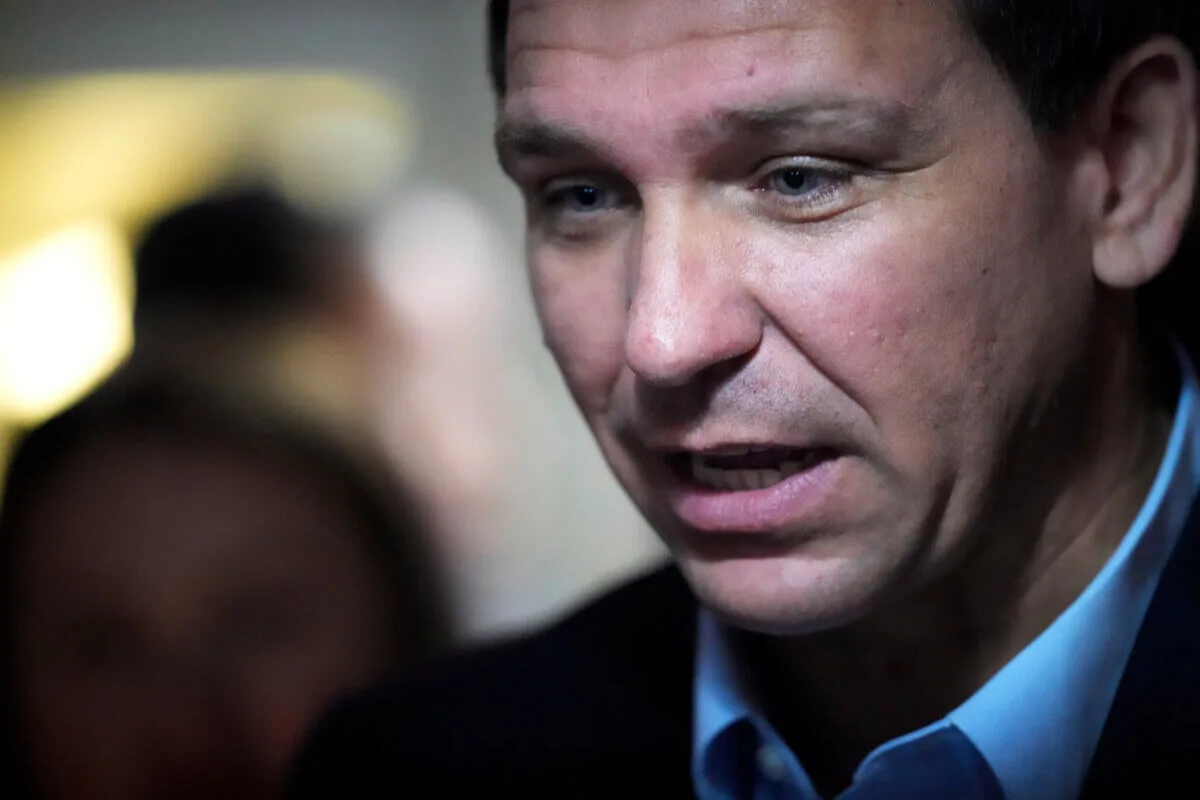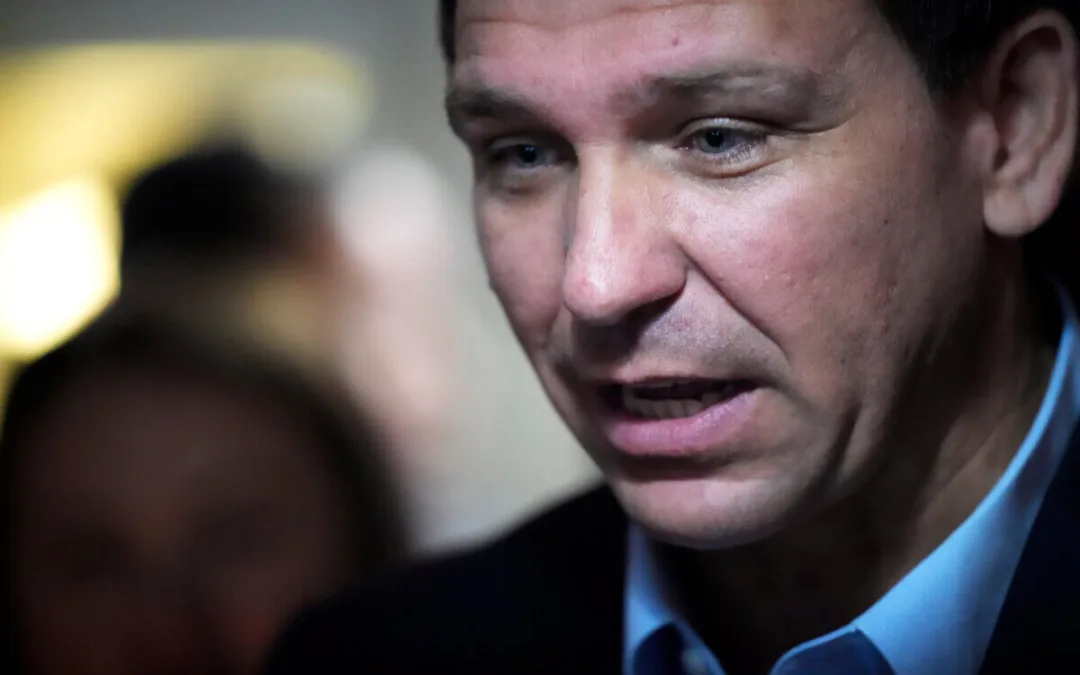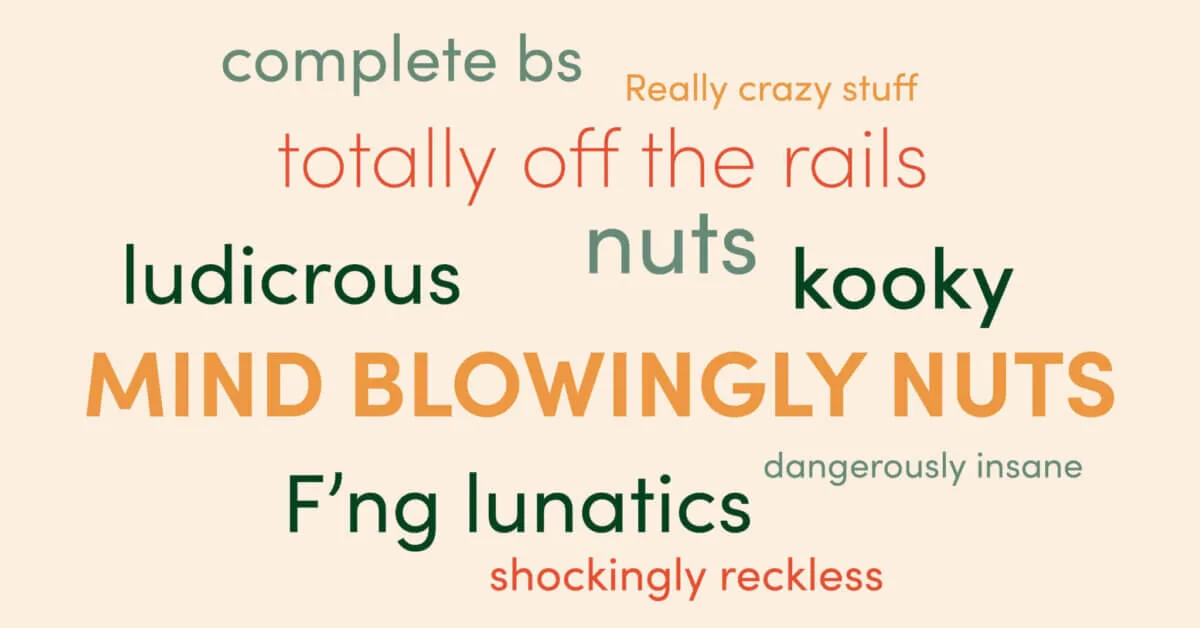
Florida Gov. Ron DeSantis speaks with a customer at the Red Arrow Diner during a visit to Manchester, N.H., Friday, May 19, 2023. (AP Photo/Robert F. Bukaty)
As part of his presidential pitch, Gov. Ron DeSantis has argued that Florida is thriving and is the freest state in the country. But what is DeSantis’ Florida really like? Let’s take a look.
Florida Gov. Ron DeSantis officially launched his 2024 campaign for president Wednesday, entering the Republican primary field with a promise to “Make America Florida.”
DeSantis filed the necessary paperwork to run and officially announced his campaign with a video posted to Twitter. DeSantis also participated in a virtual discussion on Twitter Spaces alongside two of his most vocal billionaire supporters—Twitter CEO Elon Musk and fellow tech entrepreneur David Sacks—though the platform repeatedly crashed during the event.
DeSantis enters the race firmly in second place in the polls, trailing former President Donald Trump, who has for months lobbed attacks at DeSantis that appear to have weakened the governor’s popularity among Republican primary voters.
The governor hopes to make up for any lost ground by pitching himself as a more effective conservative warrior than Trump is—specifically by pointing to his achievements in Florida and pledging to make the country more like the Sunshine state.
As part of his pitch, the governor has argued that Florida is thriving. But what is DeSantis’ Florida really like? Is it actually the “free state of Florida,” like he claims? Are Floridians actually happy with their leadership?
Let’s take a look.
A State in Turmoil
Despite DeSantis’ claims of “tangible results,” the state’s socioeconomic indicators show a lackluster picture.
- Florida ranks #1 in the US in housing unaffordability, with 56.5% of renters spending 30% or more of their income on housing. Years of “sweeping” money from the Sadowski Housing Trust Fund to fund other projects have resulted in the state losing out on 94,000 affordable housing units, according to the Florida Housing Coalition.
- The state is #2 in mass shootings. On average, someone is killed with a gun every three hours in Florida. Guns are also the third-leading cause of death for Florida children ages 1–17, according to data provided by Giffords Law Center.
- Florida is #50 in providing long-term care services and supports for elderly people among all 50 states, according to the American Association of Retired Persons.
- It is also #41 in access to health care due to DeSantis’ refusal to expand Medicaid under the Affordable Care Act, despite having the federal funds to do it. This leaves close to a million Floridians without health care coverage.
- When it comes to tax fairness, the Sunshine State ranks #45.
- It also ranks #47 in unemployment benefits. Despite inflation and the higher cost of living, DeSantis refuses to increase Florida’s unemployment benefits from a maximum of $275 per week, a cap that was set in 1998. Adjusted for today’s dollars, that would come to $485 maximum per week.
- The cost of home insurance is rising fast as the market struggles to deal with stronger hurricanes due to the climate crisis. The Sierra Club, a grassroots environmental organization in the US, assigning DeSantis a “D-” grade for his “refusal to address the climate crisis at its root, [which] has left Floridians at increased risk of more destructive and powerful storms.”
One Extreme Policy After Another
Despite the litany of issues facing Florida, DeSantis did little to address housing costs, health care access, gun violence, or other key issues during this year’s legislative session.
Instead, in an effort to pander to the GOP’s ultra-conservative base and prove to pro-Trump Republicans across the nation that he is Trump without the baggage, DeSantis signed into law dozens of extreme policies, including bills that:
- ban abortion after six weeks, before many women know they’re pregnant;
- allow people to conceal carry guns without a permit and without going through any training;
- expand the school’s education voucher program, which will siphon billions of taxpayer dollars from public schools to private and religious schools;
- allows doctors and insurance companies to deny care to anyone based on their own personal views;
- ban local governments from implementing rent control ordinances among skyrocketing rental costs;
- make it easier for landlords to impose extra junk fees on renters; and
- protect insurance companies and make it harder for Floridians to sue property insurers that don’t pay out.
Under DeSantis’ leadership, Florida has also imposed limits on how race and sexuality can be taught in schools; passed legislation that has forced schools to remove books from their libraries; and enacted several anti-LGBTQ laws, including a ban on gender-affirming care for transgender minors.
DeSantis’ policies have been so extreme that three of the nation’s largest civil rights organizations—the NAACP, the League of United Latin American Citizens (LULAC), and the Human Rights Campaign—have issued travel advisories warning that Florida has become “hostile” and “dangerous” to Latinos, Black people, and members of the LGBTQ community.
DeSantis is also in an ongoing legal fight with Disney, the state’s biggest employer, after the entertainment giant expressed opposition to his “Don’t Say Gay” law last year. As a result of DeSantis’ continued attacks on the company, Disney recently announced it was canceling a $1 billion project in the state, costing Florida 2,000 jobs.
‘The Petri Dish of Bad Ideas’
For these reasons, DeSantis’ so-called litany of “successes” ring hollow even for Republicans like Rick Wilson, a fifth-generation Floridian and Republican strategist, who describes Florida as “the Petri dish of bad ideas”.
“Some conservatives I’ve been talking to [are saying] ‘I wish he’d do more about tax cuts and less about book banning and talk more about smaller government and less about using government to punish people,’” added Wilson.
RELATED: Most Floridians Disapprove of State’s Direction, DeSantis’ Approval Rating Drops by 19 Points in New Poll
While DeSantis’ efforts may have endeared him to some of the most socially conservative voters and pundits in the country, a recent survey of nearly 3,000 Floridians by Florida Communications and Research Hub reveals unease over the state’s direction.
Before this spring’s state legislative session, a majority believed the state was on the right track (46% right track / 42% wrong track). As the session came to a close, however, 50% felt the state is headed in the wrong direction, while only 42% think it’s on the right track.

Results of the survey also showed that before the legislative session, DeSantis had a robust 60% approval rate. But by the time the legislative session was winding down in May, the governor’s approval rating had dropped by a whopping 19 points (50% approve / 49% disapprove).
Whether DeSantis can displace Trump in the GOP primary contest remains to be seen. DeSantis has thus far been reluctant to attack Trump head on, while Trump has repeatedly unleashed brutal criticisms of the man he endorsed for governor in 2018.
On Wednesday, Trump welcomed DeSantis—or as he called him, “‘Rob’ DeSanctimonious”—into the race with a series of critical posts on TruthSocial, calling him “DISLOYAL,” attacking DeSantis’ record, including his votes to cut Social Security while in Congress, and highlighting polls that show him trouncing the governor.
“Ron DeSanctus can’t win the General Election (or get the Nomination),” Trump wrote. “He was, and is, a disciple of horrible RINO Paul Ryan, and others too many to mention. Also, he desperately needs a personality transplant and, to the best of my knowledge, they are not medically available yet. A disloyal person!”
Politics

Teamsters and UPS Reach Tentative Deal to Avoid Strike, 340,000 Workers to Get Raises
The tentative deal represents a huge win for full- and part-time UPS Teamster workers, who would get significant pay raises and better working...

One Republican Senator Is Blocking 265 Military Promotions, Leaving the Marines Without a Confirmed Leader
Sen. Tommy Tuberville's decision means these military officers are not getting the pay raises they’re owed, cannot move their families to wherever...
Local News

Teamsters and UPS Reach Tentative Deal to Avoid Strike, 340,000 Workers to Get Raises
The tentative deal represents a huge win for full- and part-time UPS Teamster workers, who would get significant pay raises and better working...

One Republican Senator Is Blocking 265 Military Promotions, Leaving the Marines Without a Confirmed Leader
Sen. Tommy Tuberville's decision means these military officers are not getting the pay raises they’re owed, cannot move their families to wherever...




